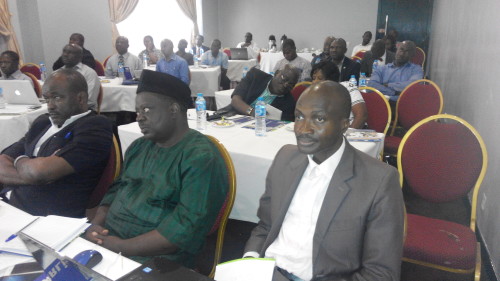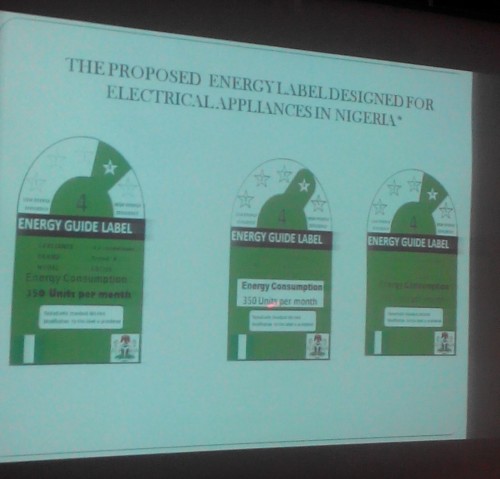A campaign aimed at promoting energy efficiency in residential and public sector buildings in the country shifted gears last week in Lagos, where stakeholders gathered to decide on two key elements of the programme.

Under the United Nations Development Programme (UNDP) and Global Environment Facility (GEF) sponsored Energy Efficiency Programme, participants at a meeting on Wednesday July 8, 2015 reviewed proposed designs of energy labels for end-user electrical appliances. After a long-drawn deliberation, they eventually reached a consensus and agreed on a label.
Similarly, on the following day on Thursday July 9, 2015, a technical committee reviewed and endorsed minimum energy standards for household refrigerating appliances (IEC 62552 series).
“We are integrating energy efficiency into an existing standard,” says Etiosa Uyigue, coordinator of the Programme, adding that the adopted energy labels will be tailored for different appliances.
According to him, the aim is to transform the energy efficiency sector by building confidence in people and developing standards to be utilised by the Standards Organisation of Nigeria (SON).
The UNDP Country Director, Pa Lamin Beyai, represented by Muyiwa Odele, submits: “The review meeting is significant because minimum energy performance standards (MEPS) contributes to energy security and reduction of greenhouse gas emissions. The development of these minimum energy performance standards not only build investors and consumers’ confidence in energy efficient products available in the country, but are also important for large scale sustainable deployment of energy efficient solutions.

“The UNDP has in the past successfully partnered with the SON to develop the MEPS for household lighting sector, which are already being enforced with lots of success stories such as considerable improvement in the quality of light bulbs in the Nigerian market.”
The overall objective of the project is to improve the energy efficiency of series of end-use appliances used in residential and public sectors in Nigeria through the introduction of standards and labels and demand-side management programmes.
Besides setting MEPS by using policy and legislative instruments, the project also aims at assisting government in the enforcement of energy efficiency policies and laws – through the setting up of internationally accredited energy efficiency testing centres for light bulbs, air conditioners, refrigerators and other appliances.
While supporting processes and programmes that will upscale the penetration of energy saving equipment, the project is creating awareness to change behaviour and to build stakeholder capacity to imbibe energy efficiency best practices for national development.
Uyigue lists some of the outcomes of the programme to include:
- Draft National Energy Efficiency Policy: The draft National Energy Efficiency Policy (NEEP) was developed and presented to over 300 national stakeholders. The NEEP was developed under the project in partnership with the Energy Commission of Nigeria (ECN).
- Minimum Energy Performance Standard for Lighting: The project working in collaboration with SON has developed the MEPS for CFLs. The draft MEPS for lighting has since been approved by the Nigerian Standard Board and it is now enforceable in Nigeria.
- Lighting Performance Testing Procedure & Infrastructure: Two complete set of light testing analysis equipment were procured and installed in the laboratories of SON and the National Centre for Energy Efficiency and Conservation (NCEEC). The testing facilities will enhance the ability of SON to enforce the newly approved lighting standard.
- Draft Energy Efficiency Training Manual: The draft Energy Efficiency Training Manual was developed under the project and it is being reviewed to position it as an acceptable teaching document used in tertiary institutions. Subsequently, the draft training manual has been sent to the National Universities Commission (NUC) for consideration as training module used in Nigerian universities.
- Inauguration of Baseline Studies: Several baseline studies were inaugurated and implemented for monitoring and evaluating the impacts of the EE interventions.
- MEPS for Refrigerators: In collaboration with SON, the project has supported the process of developing minimum energy performance standard (MEPS) for refrigerators.
- Testing Equipment for Refrigerators: Energy efficient testing chamber for refrigerator procured for SON for the enforcement of MEPS of refrigerators.
Nigeria Lighting Compliance Study: Inaugurated the Nigeria Lighting Compliance Study to access the quality of lighting products in the Nigerian market.
